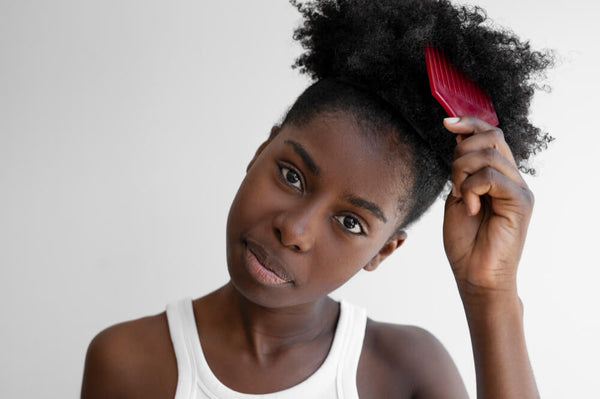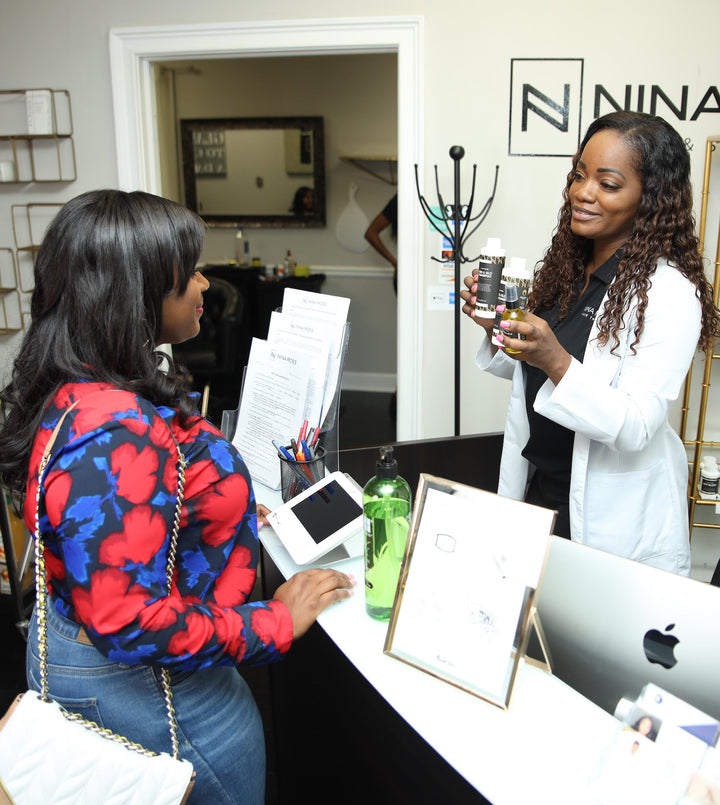Let me tell you about a client I saw last week. She'd been dealing with this stubborn patch on her scalp for months, convinced it was just dandruff. She tried every shampoo at the drugstore, but it kept coming back. When she finally came in, we discovered it was actually early-stage psoriasis that needed proper medical treatment.
I see this story play out all the time here in Atlanta. Women suffering with skin and scalp issues for way too long because they're not sure when it's "bad enough" to see a doctor.
So let's talk about when you should stop self-treating and start getting real help.
Is That Scalp Condition Something More Serious?
When your scalp:
-
Itches all the time and you cannot make it stop by scratching.
-
It is painful or tender if you touch it.
-
Grows bumps or sores that do not heal.
-
Flakes greatly even if you are using dandruff shampoos.
-
Becomes thinner in certain areas instead of thinning evenly.
…then you have to take notice. They're often signs of conditions like CCCA, psoriasis or severe folliculitis that need proper diagnosis and treatment from a good doctor. The longer you wait to treat it, the more damage can occur. And this applies in particular to scarring alopecias which can lead to the permanent loss of your hair follicles.
Why Do Black Women Need Specialized Dermatology Care?
Here's the truth that frustrates me daily: most dermatology training programs spend shockingly little time on conditions that disproportionately affect Black skin.
I can't tell you how many women come to me after being misdiagnosed by doctors who:
-
Mistook CCCA for "just thinning"
-
Prescribed treatments that would further damage textured hair
-
Didn't understand how to properly examine a Black scalp
-
Dismissed their concerns as cosmetic rather than medical
A culturally competent dermatologist knows what to look for on melanated skin and understands how treatments need to be adjusted for our unique hair texture and skin needs.
What Skin Conditions Are Most Common in Atlanta's Climate?
Our hot, humid Atlanta weather creates the perfect environment for certain skin issues:
-
Folliculitis becomes more common when sweat and bacteria get trapped around hair follicles. I see this especially in women who work out regularly or wear protective styles that don't allow proper airflow.
-
Melasma worsens with sun exposure, and many women don't realize they need sunscreen on their scalp parts and hairline.
-
Seborrheic dermatitis flares up with humidity changes and stress - both of which we have plenty of here in Atlanta.
The right dermatologist will understand these local factors and create treatment plans that work with your lifestyle, not against it.
When Should You Worry About Hair Loss Versus Normal Shedding?
Every woman sheds hair daily - that's normal. But here's when it becomes concerning:
-
You're finding hair everywhere - on your pillow, in your food, in your car.
-
Your part is noticeably wider than it was three months ago.
-
Your edges are thinning or receding.
-
Your ponytail is significantly smaller.
-
You're seeing more scalp when you pull your hair back.
If you're noticing any of these signs, please don't wait. Early intervention is everything when it comes to saving your hair.
What Can a Dermatologist Actually Do That I Can't Do Myself?
This is the question that stops many women from seeking help. Here's what changes when you work with a specialist:
-
We have the tools to see what's really happening. Through scalp biopsies and trichoscopy, we can diagnose conditions that are invisible to the naked eye.
-
We understand the connections between your skin, your hormones, your nutrition, and your overall health.
-
We have access to treatments that actually work - from prescription-strength topicals to advanced therapies like PRP and exosome treatments.
-
We can create a personal plan for you that’ll address your specific needs, instead of just generic advices.
How Do You Know If a Dermatologist Understands Black Hair and Skin?
In your first visit, observe these signs:
-
They inquire about the way you take care of your hair and the types of your hair styling habits.
-
They have before-and-after photos of patients who look like you.
-
They're familiar with conditions like CCCA and traction alopecia.
-
They do a detailed examination of your scalp.
-
They listen to your concerns without dismissing them.
If you don't feel heard or understood during that first appointment, trust that feeling. Your health deserves better.
Stop wondering if your skin or scalp issues are "bad enough" to see a doctor. If it's bothering you, it's worth getting checked out. Book your $99 Hair Therapy Evaluation at Nina Ross Hair Therapy and let's give you the peace of mind that comes with knowing exactly what you're dealing with - and how to fix it.














